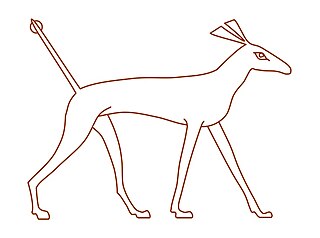Creation or The Creation may refer to:

Horus, also known as Heru, Har, Her, or Hor in Ancient Egyptian, is one of the most significant ancient Egyptian deities who served many functions, most notably as the god of kingship, healing, protection, the sun, and the sky. He was worshipped from at least the late prehistoric Egypt until the Ptolemaic Kingdom and Roman Egypt. Different forms of Horus are recorded in history, and these are treated as distinct gods by Egyptologists. These various forms may be different manifestations of the same multi-layered deity in which certain attributes or syncretic relationships are emphasized, not necessarily in opposition but complementary to one another, consistent with how the Ancient Egyptians viewed the multiple facets of reality. He was most often depicted as a falcon, most likely a lanner falcon or peregrine falcon, or as a man with a falcon head.

Set is a god of deserts, storms, disorder, violence, and foreigners in ancient Egyptian religion. In Ancient Greek, the god's name is given as Sēth. Set had a positive role where he accompanies Ra on his barque to repel Apep, the serpent of Chaos. Set had a vital role as a reconciled combatant. He was lord of the Red Land (desert), where he was the balance to Horus' role as lord of the Black Land.

In Orphic cosmogony Phanes or Protogonos is a primeval deity who was born from the cosmic egg at the beginning of creation. He is referred by various names, including Erikepaios "Power" and Metis "Thought".
Set, The Set, SET or SETS may refer to:
Pyramids of Mars is the third serial of the 13th season of the British science fiction television series Doctor Who. Written by Robert Holmes and Lewis Greifer under the pseudonym of "Stephen Harris" and directed by Paddy Russell, the serial was first broadcast in four weekly parts on BBC1 from 25 October to 15 November 1975.

Nightshade, fully titled Nightshade Part 1: The Claws of Sutekh onscreen, is an action-adventure video game released in 1992 for the Nintendo Entertainment System. It was developed by Beam Software and published by Ultra Games. The game was meant to be the first part in a series, but no sequels were ever made; however, it served as the basis for Beam Software's Super NES video game adaptation of Shadowrun.

The Canaanite religion was the group of ancient Semitic religions practiced by the Canaanites living in the ancient Levant from at least the early Bronze Age to the first centuries CE. Canaanite religion was polytheistic and, in some cases, monolatristic.

Hittite mythology and Hittite religion were the religious beliefs and practices of the Hittites, who created an empire centered in what is now Turkey from c. 1600–1180 BC.

Magic Bullet Productions is an independent audio-production company formed in 2000 by Alan Stevens, focusing on Doctor Who and Blake's 7 spinoff audios. Originally set up to produce the Kaldor City audios, in 2004 they acquired the rights to produce Lawrence Miles' Faction Paradox audio CDs.
Shams, an Arabic word meaning sun or spark may refer to:

Puppet Master 4 is a 1993 direct-to-video horror film written by Charles Band among others, and directed by Jeff Burr. It is the fourth film in the Puppet Master franchise, a sequel to 1991's Puppet Master III, and stars Gordon Currie as a young prodigy who, along with his friends, played by Chandra West, Jason Adams and Teresa Hill, is attacked by demons; the animated puppets of Andre Toulon serve to protect the group, similar to the role they played in the prequel Toulon's Revenge, rather than terrorize, as they had in the first and second films.

Puppet Master 5 is a 1994 direct-to-video horror film written by Charles Band among others, and directed by Jeff Burr. It is the fifth film in the Puppet Master franchise, the sequel to 1993's Puppet Master 4, and stars Gordon Currie as the series' third Puppet Master, and Ian Ogilvy, his colleague, whose attempts to salvage the animated puppets of André Toulon from the Bodega Bay Inn are foiled by a demon.
Creator or The Creator may refer to:
Dema or DEMA may refer to:

In ancient Egyptian art, the Set animal, or sha, is the totemic animal of the god Set. Because Set was identified with the Greek monster Typhon, the animal is also commonly known as the Typhonian animal or Typhonic beast.
In 2012, Big Finish Productions began producing audio dramas featuring Doctor Who's fourth Doctor, as portrayed by Tom Baker. Baker had previously declined to feature in any Big Finish releases, but after recording a trilogy of full cast audio boxsets for BBC Audiobooks, he decided to participate. This was also part of a spin off series of the Monthly range.









